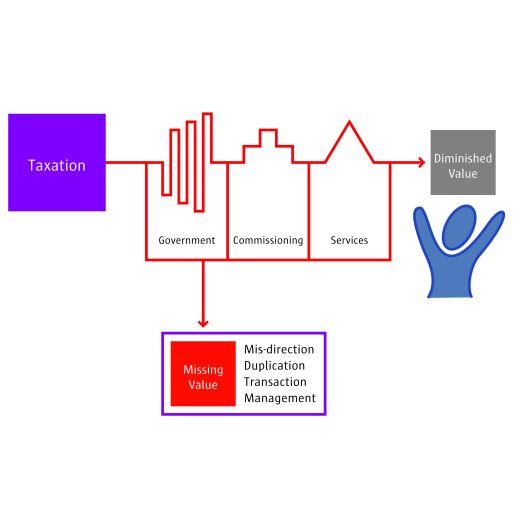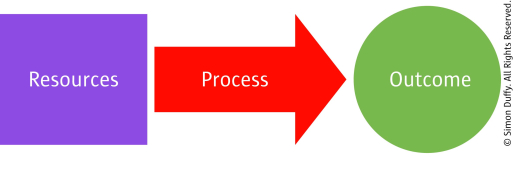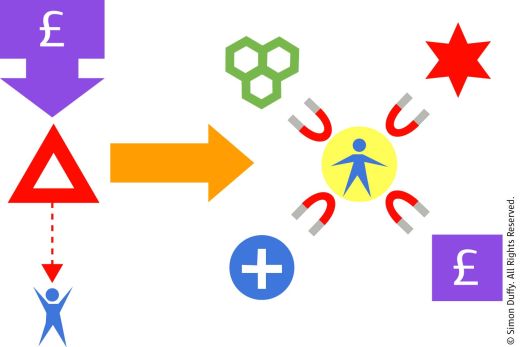Efficiency is not just technical, it is political. What is seen as waste depends upon your perspective. If we are powerful we tend to think that any money spent on us is money well spent. But if we look at services from the perspective of the citizen then it is clear that the current welfare state is very inefficient.

Public services are organised according to the Professional Gift Model. Government directs taxes towards distinct public services, commissioners further contract with services and those services are then delivered as a gift for people who need them.
But this process brings with it a series of major risks:
- Mis-direction - resources are committed to departments or functions or services. But often those are not the best forms of support from the perspective of the person. Even if the person is grateful for some support they are only able to get diminished value from the final resource. A day centre may have some good features - but you can only take it or leave it - you cannot make it fit your own needs or focus on the outcomes that are really useful to you.
- Duplication - resources are often divided up into smaller and smaller segments in order to meet some government target or current priority. Each time this happens there is a further risk of duplication and confusion. In adult social care there are a plethora of duplicated funding streams all with their own bureaucracy, eligibility criteria and complexity - and the smaller the fund the greater the complexity.
- Excessive transactions - the whole process of taking funds from tax payers, dispersing them through central and local government, apportioning them to citizens and services is inherently expensive. Each step along the way has to be paid for from civil servants to local government, from commissioners to care managers, from managers to administration - at each stage funding needs to be spent simply on transmitting funds that came from citizens back to citizens.
- Mis-management - at each level resources shift into the hands of officials and businesses who lack the natural and powerful and incentive of the citizen to manage those resources to get the most value at the best price. Instead services are overseen by people who have only a limited stake in getting value for the people they serve and who are rarely accountable to those they are there serve.
It is interesting to note that this citizen-perspective is often absent from economic discussions. Instead there is a tendency to treat given blocks of public services: schools, day centres, hospitals or whatever as inherently good. If the question of efficiency arises at all it is framed in terms of the cost of the input necessary to achieve the given service.
However there are three different ways of achieving increased efficiency:
- Resource efficiency - if we take a process as the most effective means of achieving the desired goal then resource efficiency is simply a matter of seeking the lowest cost for that process. For example, seeking the cheapest petrol for your car or the lowest staff cost for a given service.
- Process efficiency - often the greatest steps forward come from finding radically new and more effective ways of achieving the desired outcome, this does not come from better shopping but from innovation, creativity and technological developments. For example, building a new fuel efficient car or helping people find work instead of attending a day centre.
- Outcome efficiency - even more powerfully we can also sometimes change the outcome we desire to make it better, more coherent or sustainable. For example, we may change our lifestyle, walk or cycle, travel less or letting people set their own goals and live a life that makes more sense to them.

All these forms of efficiency are relevant to a discussion of efficiency in public services and there are strong reasons to believe that a shift towards increased levels of self-direction will tend to increase efficiency. In fact one of the most useful ways of thinking about the shift towards self-direction is provided by the idea of pull economics - instead of pushing resources into goods or services which we hope people will get value from we enable people to pull multiple resources together to create greater social value:
- People themselves, for any given level of resource, have the greatest incentive to shop effectively and ensure that they get the best possible value for that budget.
- People are more likely to use resources in ways which fit their interests, goals and strengths. They will not tend to do things that promote dependency weakness or increased disadvantage.
- People are more likely to identify ways to grow their own financial resources or to seek other ways of becoming independent.
- People can make best use of their relationships - family, friends, colleagues, fellows and neighbours - in a way that no one can do on their behalf.
- People are more likely to use all the options that their community offers, both because they will know it better and will directly benefit from becoming a contributing member of that community.

None of this means that there are not better and worse ways of enabling people to be in control and of getting increased social value. However these considerations provide reason to demand a strong explanation from any shift of power and resources away from people themselves. We cannot blithely assume that other people are capable of bring the same energy, expertise or commitment to someone else’s life as that person would bring themselves. And where people may lack some capacity to act in their own best interests we must take immense care to ensure that their representatives will have the most energy, motivation and relevant knowledge.
The publisher is The Centre for Welfare Reform.
Efficiency for Citizenship © Simon Duffy 2011.
All Rights Reserved. No part of this paper may be reproduced in any form without permission from the publisher except for the quotation of brief passages in reviews.


